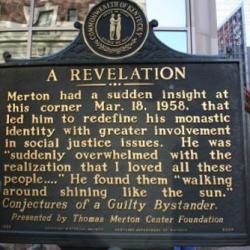And, as with the children, the problem facing the non-Christian runs deeper than anything a simple blanket amnesty can resolve. The question isn't whether they can be excused or forgiven, in light of their ignorance. The point is not that all humans are condemned unless they find a compelling excuse. The issue, rather, is that all come to earth in order to participate in an educative and transformative process. If the whole mission of Christ and His atonement is to enable change, to render repentance and personal transformation possible, to empower and sanctify, then what are we to say about the billions who have lived in obliviousness to such power and grace? The question is not how can they be rescued from damnation, but how can they be elevated or ennobled, given their inability to participate in all that His grace makes possible?
We must recognize at this juncture that only two options were ever really on the table. The first is that Christ and His gospel do uniquely empower us on our path to perfection and immortality; Christ really does embody the solution to the twin barriers to human progression: sin and death. The second possibility is that Christ and His sacrifice are not really the unique means of furthering God's plans for humankind. If the latter is the case, then the entire Christian enterprise is well intentioned but not of vital importance. Valuable perhaps across a spectrum of societal and personal functions—from famine relief to community building to moral improvement and psychological consolation—but ultimately, when all is said and done and the earth has come and gone, inessential and incapable of fulfilling its own promises.
If, on the other hand, the first is the case, then the enormous efforts legions of missionaries and evangelizers have expended through the centuries to execute the "Great Commission," to preach the gospel to all nations, tongues, kindreds, and peoples makes sense. In fact, no enterprise could be a more worthwhile undertaking. But these efforts are obviously woefully inadequate to the task of redeeming the whole of humankind. Christians are supposed to believe that Christ and His gospel are essential to mankind's eternal growth and happiness, but admit at the outset that the overwhelming majority of the human family will be forever handicapped by the accidents of history, cut off from eternal happiness because of when and where they were born?
Offering the hope of an amnesty for infants while ignoring the rest of humanity represents a rather limited defense of God's mysterious justice. It also suggests that His plan was not very effective to begin with, limited as it was to such a relatively small pool of humanity. God seems scarcely deserving of His title if this is the case. Such a God would be severely lacking in either the desire to promote a universal happiness, or the capacity to do so.
So we have a dilemma. Granting opportunity only to those who accept Christ in the flesh seems patently unfair and inefficient. Giving amnesty to all the rest of humankind makes of Christ's life and sacrifice a magnificent gesture but a superfluous or redundant one. A reasonable conception of God and His plan for us demands a third possibility.
In the early Christian centuries, Origen had taught that God would somehow find a way to redeem all of His children from the effects of sin. He never worked out the details of how that would come about, and his belief in "universal salvation" was soon declared a heresy. For centuries heaven seemed sealed shut against all save the elect, or the fortunate few believers. By the eighteenth century, the same impulse that increasingly resisted a decree of universal damnation, was in some quarters returning to Origen's vision of a universal redemption.
Some Christians organized themselves around just such a belief. "God, whose nature is Love, . . . will finally restore the whole family of mankind to holiness and happiness," proclaimed one group in 1790. He would never have created the human race, argued the influential Charles Chauncy, "unless He intended to make them finally happy." His infinite wisdom, patience, and compassion would succeed, eventually, in persuading even the most recalcitrant to accept His mercy.
This generous vision still left unaddressed the question of how the multitudes that died outside the Christian pale—or before -baptism—would be fitted for eternal life. The general solution clearly had to extend into the life to come beyond the veil of death. "'Tis true," Chauncy conceded, God "will not, in this state, prevail upon all willingly to bow down before Him as their Lord. . . May He not, . . . use means with sinners in the next state, in order to make them good subjects in the moral kingdom of God?"
Charles Beecher thought such a third way was the only reasonable alternative to mass damnation on the one hand, and a superfluous atonement on the other. A more comprehensive program than the one executed by missionaries among the living must be envisioned. In 1863, he was convicted of heresy for such a belief. The ecclesiastical court ruled that Beecher "weakens and undermines the doctrine of future punishment by teaching that the offers of salvation are made to men after death."




